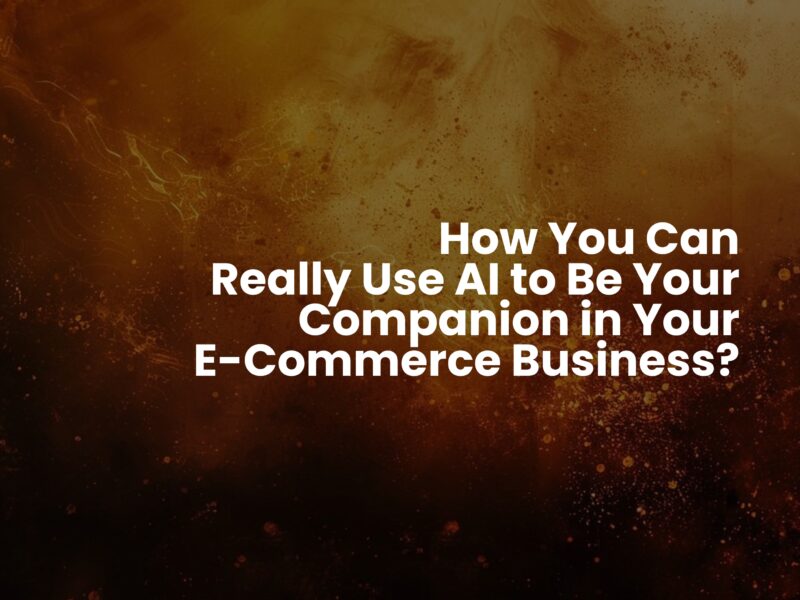Artificial Intelligence (AI) isn’t just a tech buzzword anymore — it’s a game-changing companion for modern e-commerce businesses. Whether you run a small online shop or a multi-category marketplace, AI can help you improve efficiency, boost sales, and deliver a better customer experience.
From product recommendations to customer service automation and data-driven decision making, AI has the potential to transform the way you operate your store. The best part? You don’t need to be a tech genius to make it work for you.
Let’s explore how AI can truly become your partner in growing your e-commerce business.
1. AI for Smarter Product Recommendations
Ever noticed how Amazon suggests items you didn’t even know you wanted? That’s AI in action.
AI algorithms analyse customer behaviour — such as browsing history, purchase patterns, and time spent on pages — to recommend products that shoppers are most likely to buy.
Benefits for Your E-Com Business:
- Higher conversion rates through personalised suggestions.
- Increased average order value (AOV) by promoting complementary items.
- Improved customer satisfaction as shoppers find relevant products faster.
2. AI-Powered Chatbots for 24/7 Customer Support
Customers expect quick answers, but hiring a round-the-clock support team can be expensive. AI chatbots solve this problem by providing instant responses to common questions.
Use Cases:
- Answering FAQs about shipping, returns, and payment methods.
- Guiding customers through product selection.
- Collecting leads and feedback.
A well-trained AI chatbot can handle 70–80% of routine queries, allowing human agents to focus on complex cases.
3. AI for Demand Forecasting and Inventory Management
Overstocking can drain your cash flow, while understocking can cost you sales. AI helps you strike the right balance by predicting product demand based on sales trends, seasonal factors, and market data.
Advantages:
- Prevents stockouts and lost sales.
- Reduces excess inventory costs.
- Improves supplier ordering schedules.
This is especially valuable for businesses selling health, beauty, and seasonal products with fluctuating demand.
4. AI in Pricing Optimisation
Setting the right price is a balancing act — too high and you lose customers, too low and you cut into profits. AI tools use real-time market data, competitor pricing, and consumer demand to recommend the optimal price for each product.
Outcome:
- Maximised profit margins.
- Competitive pricing without manual research.
- Dynamic price adjustments during sales events or peak demand.
5. AI for Personalised Marketing Campaigns
Generic email blasts don’t work as well as targeted campaigns. AI can segment your audience based on behaviour, demographics, and preferences, then craft tailored messages for each group.
Examples:
- Sending skincare tips and product suggestions to customers who bought beauty products.
- Offering special discounts on items left in a shopper’s cart.
- Suggesting new arrivals based on past purchases.
Personalisation increases click-through rates (CTR) and conversion rates, making your marketing more effective.
6. AI in Fraud Detection and Secure Transactions
Fraud is a major threat in e-commerce. AI-powered fraud detection systems analyse thousands of transactions in real time to spot unusual patterns, such as:
- Multiple failed payment attempts.
- Orders from high-risk regions.
- Sudden changes in order size or frequency.
This proactive approach helps protect both your business and customers from fraud.
7. AI for Smarter Content Creation
Creating product descriptions, blog posts, and social media captions can be time-consuming. AI writing assistants can help you:
- Generate SEO-friendly product descriptions.
- Write engaging headlines and ad copy.
- Create blog articles that attract organic traffic.
While AI can speed up content production, human editing ensures quality and brand voice remain consistent.
8. AI for Voice and Visual Search
More shoppers are using voice assistants and image search to find products online. AI enables your store to be voice-search and visual-search friendly, so customers can:
- Search for a lipstick shade by uploading a photo.
- Ask their voice assistant for “the best anti-aging cream” and get your products recommended.
Optimising for these technologies gives your store a competitive advantage.
9. AI for Customer Sentiment Analysis
AI tools can scan customer reviews, social media mentions, and support tickets to detect overall sentiment toward your brand or products.
This helps you:
- Spot issues before they escalate.
- Understand what customers love (and what they don’t).
- Improve products and service based on real feedback.
How to Get Started with AI in Your E-Com Business
You don’t need to implement everything at once. Here’s a simple starting plan:
- Identify the area with the biggest impact — is it customer service, inventory, or marketing?
- Choose an AI tool that integrates with your existing e-commerce platform (Shopify, WooCommerce, Magento, etc.).
- Test and optimise — start small, measure results, and scale gradually.
Final Thoughts
AI isn’t here to replace human creativity or decision-making — it’s here to enhance it. Think of AI as your business companion that works tirelessly in the background, making smarter decisions, speeding up tasks, and delivering better experiences for your customers.
By adopting AI for product recommendations, customer support, inventory management, pricing optimisation, and personalised marketing, you can run your e-commerce business more efficiently and profitably.
The future of e-commerce belongs to those who can combine human insight with AI intelligence — and that future starts now.





